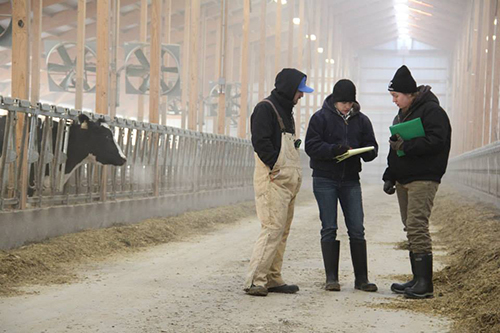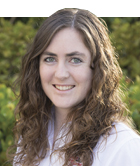
Dairy challenge competition allows students to connect the dots between classes, experiences and instinct.
I was the buzzer beater in junior dairy bowl. I studied and studied the questions, and on many of them, I could buzz in after only a few words. At the time, I thought I had a pretty fantastic grasp on the dairy industry. As I got older, I memorized fewer answers, and then I began to truly learn about dairy production.
In the past year, my dairy learning curve has taken a sharp incline as I have had many classes focusing on everything from dairy management to milk processing. Along with that, I have had the opportunity to participate on the K-State Dairy Challenge Team, which has allowed me to begin to connect the dots between those early quiz bowl questions, my experiences growing up on the farm and the dairy knowledge I have gained through classes and internships.
Dairy challenge competitions are designed to allow teams of students to get real world experience in evaluation and consultation on farms. For example, last week I traveled to Sioux Center, Iowa for the Midwest Regional Dairy Challenge. There I was grouped with four other students from across the region and asked to compile a twenty minute presentation focusing on opportunities to improve a farm. We were given the farm's records, two hours on the farm and a short interview time with the dairy's managers.
Following those few intense hours while we were pulling together the presentation, I realized how far I have come from that buzzer beating 12-year-old. I am now able to think critically about the concepts I spent so many years learning, and it is really exciting to see all those lessons tied together by collaboration with my teammates.
The biggest thing I have learned from dairy challenge has been the variety and diversity of the dairy industry. I have a new found respect for the difficulty presented to consultants who walk on a farm and are charged with identifying opportunities for improvement. I also have a greater respect for the knowledge base necessary to operate a dairy. It continually amazes me that a single individual or a group of individuals can be responsible for so much data, knowledge and management affecting the success of an operation.
 The author was the 26th Hoard's Dairyman editorial intern. She is a senior at Kansas State University in Manhattan, Kan. At KSU, Maggie is double majoring in agricultural communications and journalism and animal sciences and industry. Seiler grew up on a 130-cow registered Holstein dairy in Valley Center, Kan., near Wichita.
The author was the 26th Hoard's Dairyman editorial intern. She is a senior at Kansas State University in Manhattan, Kan. At KSU, Maggie is double majoring in agricultural communications and journalism and animal sciences and industry. Seiler grew up on a 130-cow registered Holstein dairy in Valley Center, Kan., near Wichita.






